
A set of questions to evaluate educational materials for conformance to accessibility best practices.
- Subject:
- Education
- Material Type:
- Teaching/Learning Strategy
- Provider:
- AEM Center
- Author:
- AEM Center
- Date Added:
- 05/27/2022

A set of questions to evaluate educational materials for conformance to accessibility best practices.
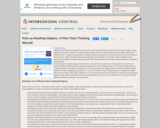
While the long-term negative impact of poor readers can be enormous, the good news is that schools can train their own students to deliver effective tutoring in reading to younger peers. Kids as Reading Helpers: A Peer Tutor Training Manual is a complete package for training peer reading tutors. Peer tutoring answers the nagging problem of delivering effective reading support to the many struggling young readers in our schools. Furthermore, peer tutoring programs can improve the reading skills of tutors as well as tutees (Ehly, 1986) and - in some studies-have been shown to build tutor's social skills as well (Garcia-Vazquez & Ehly, 1995). Young children tend to find the opportunity to read aloud to an older peer tutor to be quite reinforcing, adding a motivational component to this intervention.
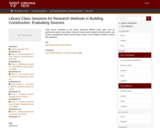
Using source evaluation as the theme, discussed different article types such as government reports, case studies, literature reviews, peer-reviewed scholarly articles, law reviews, self-published articles, and the value of each. Class included a hands-on activity with worksheet.

A free online course to assist all educators, including those new to the profession, in improving the accessibility of the materials their students use for learning...
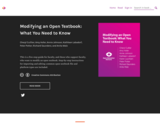
This is a five-step guide for faculty, and those who support faculty, who want to modify an open textbook. Step-by-step instructions for importing and editing common open textbook file and platform types are included.
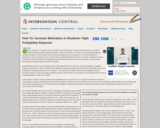
High-probability requests are one feasible classroom technique that can be effective in motivating students to engage in assigned classwork (Lee, 2006). The teacher first identifies an academic activity in which the student historically shows a low probability of completing because of non-compliance. The teacher then embeds within that low-probability activity an introductory series of simple, brief 'high-probability' requests or tasks that this same student has an established track record of completing (Belfiore, Basile, & Lee, 2008).
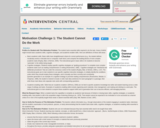
Profile of a Student with This Motivation Problem: The student lacks essential skills required to do the task. Areas of deficit might include basic academic skills, cognitive strategies, and academic-enabler skills. Here are teacher behaviors to help fix this motivation problem.
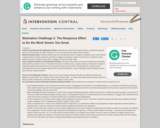
Although the student has the required skills to complete the assigned work, he or she perceives the ‘effort’ needed to do so to be so great that the student loses motivation. Learn teacher behaviors to fix this motivation problem.
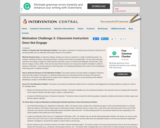
The student is distracted or off-task because classroom instruction and learning activities are not sufficiently reinforcing to hold his or her attention. Learn teacher behaviors to help fix this motivation problem.
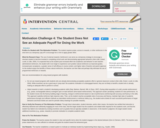
The student requires praise, access to rewards, or other reinforcers in the short term as a temporary ‘pay-off’ to encourage her or him to apply greater effort. Learn teacher behaviors to help fix this student motivation problem.
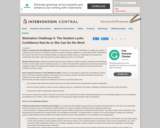
The student has a low sense of self-efficacy in a subject area, activity, or academic task and that lack of confidence reduces the student’s motivation to apply his or her best effort. NOTE: Self-efficacy is the student’s view of his or her own abilities specific to a particular academic area (e.g., mathematics) and should not be confused with self-esteem, which represents the student’s global view of his or her self-worth. Learn teacher behavior to help fix this student motivation problem.
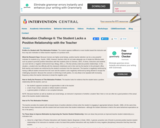
The student appears indifferent or even hostile toward the instructor and thus may lack motivation to follow teacher requests or to produce work. Learn teacher behaviors to help with this student motivation problem.
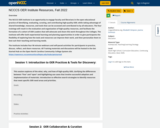
The NCCCS OER Institute is an opportunity to engage faculty and librarians in the open educational practice of identifying, evaluating, curating, and contributing high-quality OER; while taking advantage of shared knowledge, resources, and tools that can be accessed and contributed to by all educators. The four trainings will result in the evaluation and organization of high-quality resources, and facilitate the formation of a cohort of OER Leaders that will advocate and share this work throughout the Colleges. The Institute will offer both experiential learning and planning opportunities in order to give participants the flexibility of exploring how the tools and resources can improve their work, and then personalize them to best suit their teaching and learning needs.The Institute includes four 90 minute webinars and self-paced activities for participants to practice, discuss, reflect, and share resources. All Training materials and discussions will be hosted in the Get Started Hub on the Open North Carolina Community College System site https://opennccc.nccommunitycolleges.edu/hubs/getstarted
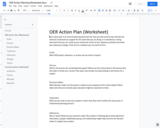
Your action plan is an internal planning document for how you will convince key internal and external constituents to support for the work that you are doing. It is intended as a living document that you can revisit as you review the results of your advocacy activities and refine your advocacy strategy. Think of it as a skeleton you can work to fill in.
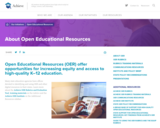
Open Educational Resources (OER) offer opportunities for increasing equity and access to high-quality K–12 education. Many state education agencies now have offices devoted to identifying and using OERs and other digital resources in their states. To help states, districts, teachers, and other users determine the degree of alignment of OERs to the Common Core State Standards, and to determine aspects of quality of OERs, Achieve has developed eight rubrics in collaboration with leaders from the OER community.
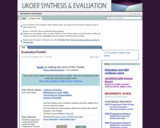
The toolkit is made up of three elements:
1). information and resources to support your evaluation activities
2). an interactive tool to guide you through our Evaluation and Synthesis framework, providing an opportunity to submit findings, observations and links to evidence AND which feeds this back to you for inclusion in your project reporting mechanisms
3). examples of evaluation materials, instruments and reports from other UKOER projects

OER Fundamentals are invited to remix this course planning template to design and share their OER project plans, course information and syllabus, and reflection.
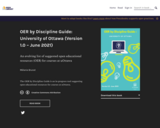
The OER by Discipline Guide: University of Ottawa is an in-progress tool suggesting open educational resources for specific courses at the University of Ottawa. Its purpose is to help professors get acquainted with existing OER in their disciplines and facilitate their use. It will be updated annually as new resources are identified.
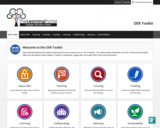
The OER Toolkit aims to improve equitable access to open learning resources and services to college students by providing a province-wide academic support platform for faculty to use while designing courses and assignments. The Toolkit is a one-stop guide to open educational resources, providing faculty and library staff with tools and information to understand, engage with, create, and sustain OER in their work and practice.
The Toolkit is designed to be used by anyone involved with OER at an academic institution, whether you are part of a team that is collaborating to create OER, a library staff member who is supporting OER development and use, an advocate for OER at your institution, or an instructor seeking to incorporate OER and open pedagogy in the classroom. The primary purpose of this Toolkit is to support faculty and library staff at Ontario colleges; however, it is openly available for use beyond the Ontario college community.

This Guide details a variety of resources useful for evaluating and selecting appropriate and accessible OERs that will be usable by the broadest range of learners